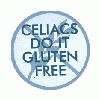
Lisa
-
Posts
8,691 -
Joined
-
Last visited
-
Days Won
15
Lisa's Achievements
-
-
Need an answer on this pretty quick.
Mom has a doctor's appointment tomorrow.
I wrote about her in another post.
She's 83, and having a few tummy woes and edema.
Can anyone let me know if they still have testing done for the possibility of gluten slipping by in the diet even years from diagnosis?
If so, what test (Gliadin IgA, ttg, IgG?).
Thanks for any info, which I need by Monday.....
Anti-gliadin antibodies (AGA) both IgA and IgG
Anti-endomysial antibodies (EMA) - IgA
Anti-tissue transglutaminase antibodies (tTG) - IgA
Total IgA level.
Good luck with your mother.
-
My understanding has been that oats are a concern if they are grown in a non-dedicated field, which also could contain some wheat grass -- not because they're processed in much the same manner as wheat.
We Luv Gators, thanks so much for your information! I hope you report back again after you meet with that friendly farmer. As a super-sensitive, it's very helpful to me to understand where some of the known cross contamination is taking place -- sad to think it's right there at harvest.
For those who are doubters, I'm not sure I see the difference between your food touching wheat as it's being harvested because of a shared combine, or touching wheat during the cooking process because of a shared grill -- cross contamination is cross contamination, regardless.
BECAUSE...I can see the oats milled or processed with an occasional wheat cross contamination as it's packaged and presented.
I can't see my zucchini, beans, squash, nor my corn, nor my tomatoes, watermelon, cantaloupe with tiny pieces of wheat embedded or processes into them. Whatever dirt or debris I see, I rinse off, as most would do.
The fear is just not there (in my opinion). There is no "known cross contamination" as you speak. There is no "hidden agenda" here. If you know of any substantial documentation, that supports the dangers of harvested foods from a previous wheat field, please post it.
I think it's very unfair for the newbies entering this site, to be overwhelmed with the "what if's" and it creates unnecessary fear.
-
Integrative Manual Therapist.
What does he do and how does he do it?
-
When I buy fresh product, I wash it well under running water before I cook it and eat it, much the same way that I would wash a plate or a pan before I re-used it again.
I see no alarm nor concern from field cross contamination, with the exception of possibly oats which are processed in much the same manner as wheat.
-
I agree with Elizabeth. It can take up to several month of diligence on the gluten free diet to see improvement for some.
Initially, if you have intestinal damage, any food will be an issue. And until your villi are on the road to recovery, it's hard to tell a "glutening" from a damaged intestinal track. It all blends in.
I would continue to be as totally gluten as possible (with the exception of dairy) and eliminate gluten as an issue before you tackle other food issues.
-
I also love Cadbury eggs. Since I was a really little kid cadbury cream eggs have been one of my favorite candies. However, it does list wheat as being in the ingredients so I wouldn't trust them. However, I could be wrong because I am also very new to all this so if you still aren't sure I would ask a dietician or someone who may know better than me. It seems that there is a very mixed opinion on whether they are ok or not. Let usknow what you find so I know if I can have them again if they are deemed safe.
GLUCOSE, GLUCOSE SYRUP AND CARAMEL COLOUR
.
It is important for those following a gluten-free diet to incorporate the latest valid scientific information into their diets. Under current Australian food law,
.
glucose, glucose syrup and caramel colour are "gluten-free",
even if derived from wheat, as the wheat is so highly processed,
there is no gluten detected.
.
Glucose, glucose syrup, caramel and similar ingredients have no detectable gluten, even if derived from wheat.
.
New food labelling laws require food labels to list all ingredients derived from wheat, rye, barley and oats.
This does not mean that all ingredients derived from these sources actually contain gluten.
So, it is a legal requirement that the source be declared, but remember that ingredients derived from wheat that are gluten free are:
dextrose, glucose and caramel colour (additive 150).
.
Additionally:
Open Original Shared Link
Glucose syrup
A gluten-free sweetener made most frequently from corn, but also from tapioca, potato, sorghum or wheat starch. It is such a highly processed and purified ingredient that the source of the starch does not matter. Even if you see glucose syrup derived from wheat on a label, it is still gluten free
.
-
https://www.celiac.com/gluten-free/index.ph...mp;#entry479742
Here is information that will direct you to the R.O.C. K. Gluten Free Candy List for 2008.
-
I'm eating Cool Whip and spice cake as we speak.
 It's not Laura's mother's, but still good.
It's not Laura's mother's, but still good. 
-
http://gfkitchen.server101.com/GFAlcohol.htm#Wine
http://www.glutenfreedrinks.com/AlcoholBeverages_Wines.htm
You might find this informative. I do not know the reliability of these references. I would also advise to contact the manufacturer, if you find yourself sensitive to wines.
I, personally, have never had an issue.
-
I've read the deodorant debate. Unless you lick your deodorant, why bother finding a gluten free one. However, if you shave under your arms and nick or cause abrasions, couldn't it enter your bloodstream?
With regard to Celiac, gluten must be consumed to have a reaction which takes place in the digestive system. If someone would have a gluten allergy, topical gluten may cause concern or a reaction.
-
Yesterday I check out the mini and other eggs by Cadbury. Here in Wisconsin they all have wheat listed on the label.
Glucose (wheat) is highly refined and is considered safe for most people with Celiac to consume. Please read the entire link provided above.
They are made by Hershey (in the US), who's policy is not to disclose their source of "natural flavors". I try not to support Hershey for that reason.
-
Open Original Shared Link
Is Rice Dream Beverage a gluten free product?
Yes. Although Rice Dream Beverage is processed using a barley enzyme, the barley enzyme is discarded after use. The final beverage might contain a minute residual amount (less than .002%) of barley protein. For a list of gluten free products click here
Counsidering the above statement, I think you have to judge for yourself. If it's something that bothers you, try another product.

-
Agreed David, but please also bear in mind that the thread you commented on is over three years old and the information is very dated.
-
Krystal,
Two week is a relatively short time to master the diet and it can be very complicating as you're finding now.
I can't comment about the particular products that you mentioned, but it's always a good rule of thumb to add one thing at a time. That way you can be specific if a product does not settle well with you.
Since you're so new to the diet, I would recommend the Triumph Dining Grocery Guide. It lists over 30,000 main stream grocery product commonly found. I sure wish I had it when I was beginning the diet.
Oh BTW, we did have a disruption on the Board tonight and I hope it didn't cause you any difficulty.
-
Symptoms noticed-some tummy bubblies and then gas, noticed for 2 weeks.
Purple,
Are these the symptoms which you concluded were caused by parasites?
-
Looking for information on Melatonin, I came accross this information that I thought was interesting.
Open Original Shared Link
-
-
Do you mean speculation of the part of the director of the CA citrus growers association? I am going to pm you the original letter, signature and phone number.
I believe him.
That's fine, and I'm glad that you do
 . But, I was just saying that it does not appear to speak with any specifics.
. But, I was just saying that it does not appear to speak with any specifics. Thank you for the contact information.
-
OK - I'm over it... Maybe I should change my username to "too sensitive". Can I blame the gluten in the Ezekiel bread? That's it - I was glutened! Well, I'm learning - the bread didn't create a digestive problem, but now I realize that just because it didn't cause me to run to the bathroom, doesn't mean it didn't do damage to my body in some way.
I'm throwing away the bread! Sorry I was so sensitive...

S.

-
Dear Lisa,
I apologize for the delay in responding to your question of the presence of Gluten in produce coatings. The only produce I can respond to is citrus as we are not involved with any other commodities. Our experts tell us that while it is possible that there could be some wheat protein used for coatings, generally these are not used because of the cost and the difficulty in formulation. The other possible source is from ethanol which is used in coatings for several commodities including citrus. While most ethanol is made from corn, some could be made from other grains. It is thought that the gluten is destroyed in the manufacturing process. Finally, if there are trace amounts of gluten in the final product these are on the peel of the citrus only and could only possibly be a factor if someone were to eat the peel. In closing, I would suggest that you contact the representative organizations for the other commodities if you have further questions.
Sincerely,
California Citrus Mutual
512 N. Kaweah Ave.
Exeter, Ca. 93221
This sounds like a lot of speculation and very little fact, in my opinion. But, thank you for posting this.
-
All of Burts Bees are gluten free.
-
There is a possibility that your son was misdiagnosed. Could you elaborate on how he was diagnosed. As unreliable as testing is in to 2000's, it hard to imagine the reliability in the 50's.
-
The flu shot has been subject to much debate here in the past. You can do a search for the full discussion(s).
It was recommended for me and I had no ill effects from the shot. Although, people with egg allergies or sensitivities, should not take the shot as suggested.
-
Oh, I am pretty sure Irish Davey boy was just joking. Certainly that web site is way off the mark. The site does say it is meant to be satire.
I am certain that Irish Dave Boy was joking and he was very clear about the satirical nature of his post. We all need some humor to get by with our daily struggles.






Need Help With Store Bought Items
in Gluten-Free Recipes & Cooking Tips
Posted
Progresso Creamy Mushroom Soup is gluten free. The Gluten Free Pantry has a corn bread mix that's ok. I usually add sugar, salt, sour cream, corn and green chili peppers to mine.
Whole Foods grocery store may have pre-made corn bread.